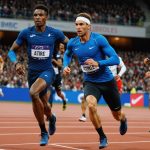Understanding Gluten and Its Role in Athletic Performance
Gluten, a protein found in wheat, barley, and rye, often finds its way into various diets, particularly those rich in grains. Its presence is not inherently negative for athletic performance; in fact, gluten can play a pivotal role in sports nutrition. Whole grains containing gluten are a source of carbohydrate, essential for providing energy during workouts and aiding in muscle recovery post-exercise.
Concerning energy and muscle recovery, gluten-containing grains furnish athletes with carbohydrates that can help sustain energy levels. These carbohydrates replenish glycogen stores, directly contributing to optimal athletic performance.
In parallel : Exploring the Benefits and Challenges of Self-Driving Cars in Emergency Medical Services
Despite some myths, gluten does not have a universal negative impact on athletes. Many perceive gluten as detrimental, often due to its association with disorders like celiac disease, where gluten must be strictly avoided. However, for those without such conditions, gluten itself does not inherently impair performance.
Understanding this can help dispel common misconceptions and encourage athletes to focus on balanced sports nutrition that includes a variety of nutrients. Recognising gluten’s potential benefits, athletes can better tailor their diets to support their specific performance and recovery needs. By integrating gluten-rich foods mindfully, athletes can enhance their overall nutrition strategy.
In parallel : Exploring the Impact of Virtual Reality on Cognitive Rehabilitation for Brain Injury Recovery
Effects of Gluten-Free Diets on Athletic Performance
Gluten-free diets have gained traction among athletes, with many claiming improved athletic performance and heightened energy levels. This emerging trend merits a closer examination of its potential impacts, both positive and negative.
Positive Effects on Performance
Athletes adopting gluten-free diets often report increased energy levels, which can enhance performance metrics. Individuals who previously experienced gluten sensitivity or intolerance may find significant improvement in their vitality once gluten is removed. This is supported by several case studies highlighting athletes who transitioned to gluten-free diets and displayed enhanced speed and stamina.
A crucial consideration is ensuring nutritional adequacy. Gluten-free diets must be carefully managed to incorporate energy-rich alternatives like quinoa, brown rice, and gluten-free oats, which can sustain energy levels efficiently. By including a well-rounded selection of naturally gluten-free carbohydrates, athletes may maintain or even boost energy without the adverse effects caused by gluten consumption.
Negative Effects on Performance
Conversely, some athletes face challenges with gluten-free diets, particularly regarding nutrient deficiencies. Essential nutrients such as iron, B vitamins, and fiber may be lacking, potentially impacting stamina and endurance. Comparative studies indicate mixed results, with some athletes experiencing diminished performance compared to those on gluten-containing diets, underscoring the importance of personalized nutritional strategies.
Recovery Outcomes on Gluten-Free Diets
The impact of gluten-free diets on muscle recovery is gaining attention among athletes and nutritionists alike. Gluten has been found to influence recovery mechanisms by potentially causing inflammation in sensitive individuals, which can hinder muscle recovery. Eliminating gluten from one’s diet might reduce this inflammation, leading to improved recovery outcomes.
When we compare recovery times between gluten-free and traditional diets, there is some evidence suggesting faster recovery for those who avoid gluten. This could be due to decreased inflammatory responses and better nutrient absorption. While the precise effects can vary from person to person, anecdotal evidence from athletes supports these observations.
Athletes often share testimonials about their experiences with gluten-free diets, highlighting improved performance and recovery outcomes. For instance, some report feeling lighter and experiencing less muscle stiffness after workouts. These personal accounts, while subjective, offer insight into the potential benefits of a gluten-free regimen.
However, it’s essential to approach gluten-free diets with personalised understanding, as the recovery outcomes can differ based on individual sensitivity to gluten and other factors. Consulting with a nutrition expert can provide tailored advice, ensuring adequate nutrient intake for optimal muscle recovery.
Nutritional Alternatives for Gluten-Free Athletes
Navigating sports nutrition as a gluten-free athlete involves making strategic dietary choices that align with performance goals. Embracing gluten-free alternatives can offer the necessary nutrients while maintaining optimal energy levels and overall health.
Whole Food Options
Athletes need to identify nourishing, whole foods that naturally lack gluten. Choices like quinoa, brown rice, and sweet potatoes are excellent, providing carbohydrates without the gluten. Balancing macronutrients in a gluten-free diet is crucial; proteins from lean meats, eggs, and legumes alongside healthy fats from avocados and nuts help maintain energy levels and muscle health. Hydration is key, and fiber intake should not be overlooked, with options such as chia seeds and leafy greens supporting digestion and sustained energy.
Supplements and Nutrients to Consider
Gluten-free athletes may need additional supplements to compensate for any nutritional gaps. Vitamins and minerals play a pivotal role in performance and recovery, with vitamin D and B complex being particularly beneficial. The role of supplementary nutrition should be carefully considered; omega-3 fatty acids and iron might be necessary to boost performance and recovery. These supplements can help ensure athletes maintain peak performance, complementing their core dietary choices.
Practical Tips for Adopting a Gluten-Free Diet in Sports
Transitioning to a gluten-free diet can be seamless for athletes with the right strategies. Meal prep is a key component in this dietary shift. Planning meals in advance not only ensures you maintain a balanced diet but also helps avoid the temptation of gluten-laden convenience foods. Cooking in batches and storing meals in portioned containers allows athletes to focus on their training rather than their next meal.
Reading labels is crucial. Understanding how to identify gluten-containing ingredients helps avoid cross-contamination. Words like “wheat,” “barley,” or “rye” should raise red flags. Moreover, always check for labels indicating the product was processed in a gluten-free facility.
Resources tailored for gluten-free athletes are abundant. Mobile apps can identify gluten-free restaurant options, while cookbooks offer sport-friendly meal ideas without gluten. Online forums and support groups provide encouragement and share successful strategies.
To support this dietary shift, consider these athlete recommendations:
- Consult a nutritionist familiar with sports and gluten-free diets.
- Track intake to ensure all nutritional needs are met.
- Experiment with gluten-free alternatives to traditional athlete staple foods like pasta and bread.
By embracing these practical tips, athletes can enhance their performance while adhering to their dietary requirements.
Expert Opinions and Scientific Perspectives
Gaining perspectives from both expert opinions and scientific studies can guide athletes in making informed dietary choices. When considering sports nutrition, insights from nutritionists are invaluable. They often recommend personalised approaches, focusing on understanding individual needs. This includes considering dietary restrictions, such as gluten intolerance, ensuring each athlete receives optimal nutritional benefits.
Insights from Nutritionists
Sports nutritionists commonly emphasize tailoring diets to fit the specific nutritional requirements of athletes. This customization is particularly relevant when considering gluten-free diets. Despite popular beliefs, some nutritionists caution against unnecessary restrictions unless prompted by medical necessities like celiac disease. The effectiveness of gluten-free diets is debated and varies significantly among individuals. Evaluating one’s dietary needs with a professional can prevent nutrient deficiencies.
Recent Scientific Studies
Scientific studies provide deeper insights into the relationship between gluten and athletic performance. Some research indicates that a gluten-free diet can be beneficial for those with gluten sensitives, albeit not universally advantageous for all athletes. The implications of these studies underscore the importance of avoiding generalized dietary trends without evidence-based backing. Looking forward, future research needs to focus on more personalized sports nutrition, considering genetic, environmental, and lifestyle factors to further optimise athletic performance. This alignment of expert knowledge and scientific research helps cultivate a balanced and effective nutritional strategy.
Case Studies and Personal Testimonials
In recent years, numerous athlete experiences have highlighted the impact of gluten-free diets on performance and well-being. Success stories among athletes adopting gluten-free lifestyles abound, showcasing diverse sports perspectives on this dietary approach. From runners to bodybuilders, each narrative offers unique insights into the gluten-free experience.
For instance, many athletes report enhanced energy levels and reduced digestive discomfort after embracing gluten-free diets. These case studies consistently underscore the importance of individualized dietary adjustments in optimizing athletic performance. Personal testimonials often emphasize the challenges initially faced, such as identifying gluten-free alternatives and maintaining nutritional balance.
Athletes across various disciplines share valuable lessons learned from their dietary changes. One common insight is the significance of thorough research and planning when transitioning to a gluten-free diet. By consulting nutritionists and carefully selecting gluten-free products, athletes can avoid potential deficiencies and maintain peak performance.
Moreover, these personal stories frequently include anecdotes of trial and error, underscoring both the successes and setbacks encountered. By examining these athlete experiences, aspiring individuals can glean practical strategies and avoid common pitfalls. Ultimately, the combination of case studies and personal testimonials provides a rich tapestry of knowledge, encouraging others to explore their unique path to dietary success.







